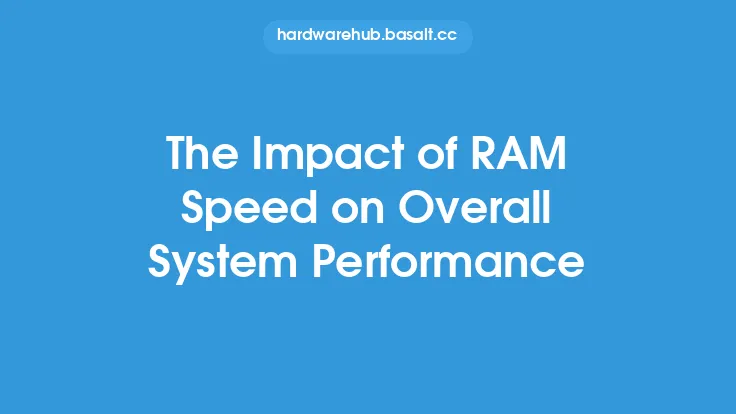The relationship between RAM speed and CPU performance is a complex and multifaceted one, with various factors at play. At its core, RAM (Random Access Memory) speed refers to the rate at which data can be read from and written to the memory module. This speed is typically measured in MHz (megahertz) or GHz (gigahertz) and is a critical component in determining the overall performance of a computer system. The CPU (Central Processing Unit), on the other hand, is the brain of the computer, responsible for executing instructions and handling data processing.
Introduction to RAM and CPU
To understand the relationship between RAM speed and CPU performance, it's essential to first grasp the basics of how RAM and CPU interact. The CPU relies on RAM to store data temporarily while it's being processed. When the CPU needs to access data, it sends a request to the RAM, which then retrieves the data and sends it back to the CPU. The speed at which this data transfer occurs is critical, as it directly impacts the CPU's ability to perform its tasks efficiently. Faster RAM speeds allow for quicker data transfer, which in turn enables the CPU to process more instructions per second.
The Role of RAM Speed in CPU Performance
RAM speed plays a significant role in CPU performance, particularly in systems where the CPU is heavily reliant on memory access. In general, faster RAM speeds can improve CPU performance in several ways. Firstly, faster RAM speeds reduce the time it takes for the CPU to access data, allowing it to execute more instructions per second. This is especially important in applications that require frequent memory access, such as scientific simulations, video editing, and gaming. Secondly, faster RAM speeds can help to reduce the CPU's idle time, which occurs when the CPU is waiting for data to be retrieved from memory. By minimizing this idle time, faster RAM speeds can help to increase the CPU's overall throughput and efficiency.
Technical Aspects of RAM Speed and CPU Performance
From a technical standpoint, the relationship between RAM speed and CPU performance is influenced by several factors, including the CPU's memory controller, the type of RAM used, and the system's memory bandwidth. The memory controller is a critical component that manages data transfer between the CPU and RAM. Its speed and efficiency can significantly impact the overall performance of the system. Additionally, the type of RAM used can also affect performance, with newer types of RAM such as DDR4 and DDR5 offering faster speeds and lower latency than older types like DDR3. Memory bandwidth, which refers to the amount of data that can be transferred between the CPU and RAM per second, is also an essential factor in determining the relationship between RAM speed and CPU performance.
CPU Architectures and RAM Speed
Different CPU architectures have varying levels of sensitivity to RAM speed. For example, CPUs with integrated memory controllers, such as those found in AMD's Ryzen and Intel's Core series, tend to be more sensitive to RAM speed than those with external memory controllers. This is because integrated memory controllers are designed to optimize memory access and can take advantage of faster RAM speeds to improve overall system performance. On the other hand, CPUs with external memory controllers may not benefit as much from faster RAM speeds, as the memory controller can become a bottleneck in the system.
Real-World Implications of RAM Speed and CPU Performance
In real-world scenarios, the relationship between RAM speed and CPU performance can have significant implications for system performance and efficiency. For example, in gaming systems, faster RAM speeds can improve frame rates and reduce lag, while in scientific simulations, faster RAM speeds can accelerate data processing and reduce overall computation time. Additionally, in systems where multiple applications are run simultaneously, faster RAM speeds can help to improve overall system responsiveness and reduce the likelihood of bottlenecks.
Conclusion
In conclusion, the relationship between RAM speed and CPU performance is complex and influenced by various factors, including the CPU's memory controller, the type of RAM used, and the system's memory bandwidth. While faster RAM speeds can improve CPU performance in certain scenarios, the actual impact of RAM speed on CPU performance depends on the specific system configuration and application workload. As CPU architectures continue to evolve and memory technologies improve, the relationship between RAM speed and CPU performance will remain an essential consideration for system builders and enthusiasts seeking to optimize their systems for maximum performance and efficiency.





